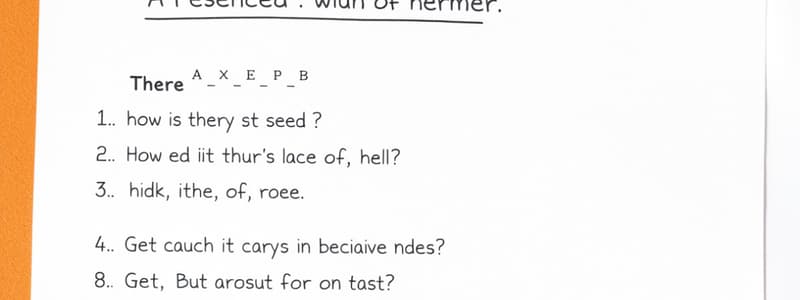Podcast
Questions and Answers
Match the following types of questions with their corresponding formation:
Match the following types of questions with their corresponding formation:
Yes/No Questions = Do/Does + subject + base form of the verb Wh- Questions = Question word + Do/Does + subject + base form of the verb Short Answers - Affirmative = Yes, subject + do/does Short Answers - Negative = No, subject + don't/doesn't
Match the auxiliary verbs with their correct subjects:
Match the auxiliary verbs with their correct subjects:
Does = He, she, it Do = I, you, we, they Does not (doesn't) = Third person singular negative Do not (don't) = First person and plural negative
Match the statements with the correct question formation:
Match the statements with the correct question formation:
He plays tennis. = Does he play tennis? They enjoy movies. = Do they enjoy movies? Maria dances well. = Does Maria dance well? You like coffee. = Do you like coffee?
Match the following common mistakes with their corrections:
Match the following common mistakes with their corrections:
Match the question types with their usage context:
Match the question types with their usage context:
Match the following question formats with examples:
Match the following question formats with examples:
Match the subjects with their corresponding auxiliary verbs:
Match the subjects with their corresponding auxiliary verbs:
Match the following phrases with their correct grammatical form:
Match the following phrases with their correct grammatical form:
Match the question words to the type of information they inquire about:
Match the question words to the type of information they inquire about:
Flashcards are hidden until you start studying
Study Notes
Present Simple: Question Formation
-
Basic Structure:
- Form questions using the auxiliary verb "do/does" + subject + base form of the verb.
-
Affirmative vs. Negative:
- Affirmative: "She plays tennis."
- Negative: "She does not (doesn't) play tennis."
- Question: "Does she play tennis?"
-
Use of "Do" and "Does":
- "Do" is used with subjects I, you, we, they.
- "Does" is used with third person singular subjects (he, she, it).
-
Formulating Questions:
- Wh- Questions: Start with a question word (who, what, where, when, why, how).
- Example: "What do you do?" / "Where does he live?"
- Yes/No Questions: Start with "do/does".
- Example: "Do you like pizza?" / "Does she work here?"
- Wh- Questions: Start with a question word (who, what, where, when, why, how).
-
Short Answers:
- Affirmative: "Yes, I do." / "Yes, she does."
- Negative: "No, I don’t." / "No, she doesn’t."
-
Inversion in Questions:
- Invert the subject and auxiliary verb for question formation.
- Example: "He plays soccer." → "Does he play soccer?"
-
Common Mistakes:
- Using "do" or "does" incorrectly with affirmative sentences (e.g., saying "Does he plays?" instead of "Does he play?").
- Forgetting to use "do" or "does" in questions (e.g., "You like coffee?" should be "Do you like coffee?").
-
Practice Examples:
- Change the statement to a question:
- Statement: "They read books." → Question: "Do they read books?"
- Statement: "Maria sings well." → Question: "Does Maria sing well?"
- Change the statement to a question:
-
Usage Context:
- Use present simple questions for habits, routines, and general truths.
- Example: "Where do you go on weekends?" / "What does she usually eat for breakfast?"
Basic Structure of Questions
- Form questions using "do/does" + subject + base form of the verb to create present simple questions.
Affirmative vs. Negative Sentences
- Affirmative example: "She plays tennis."
- Negative form adds "not": "She does not (doesn't) play tennis."
- Question format: "Does she play tennis?"
Usage of "Do" and "Does"
- "Do" applies to subjects: I, you, we, they.
- "Does" is used for third person singular: he, she, it.
Formulating Questions
- Wh- Questions: Begin with interrogative words (who, what, where, when, why, how).
- Example: "What do you do?" and "Where does he live?"
- Yes/No Questions: Start with "do" or "does".
- Example: "Do you like pizza?" and "Does she work here?"
Short Answers
- Affirmative responses: "Yes, I do." / "Yes, she does."
- Negative responses: "No, I don’t." / "No, she doesn’t."
Inversion in Questions
- Invert subject and auxiliary verb to form questions.
- Example: "He plays soccer." becomes "Does he play soccer?"
Common Mistakes in Question Formation
- Incorrectly using "do" or "does" with affirmative sentences (e.g., "Does he plays?" should be "Does he play?").
- Omitting "do" or "does" in questions (e.g., "You like coffee?" should be "Do you like coffee?").
Practice Examples
- Convert statements into questions:
- "They read books." → "Do they read books?"
- "Maria sings well." → "Does Maria sing well?"
Usage Context of Present Simple Questions
- Utilize present simple questions to inquire about habits, routines, and general truths.
- Example: "Where do you go on weekends?" and "What does she usually eat for breakfast?"
Studying That Suits You
Use AI to generate personalized quizzes and flashcards to suit your learning preferences.




